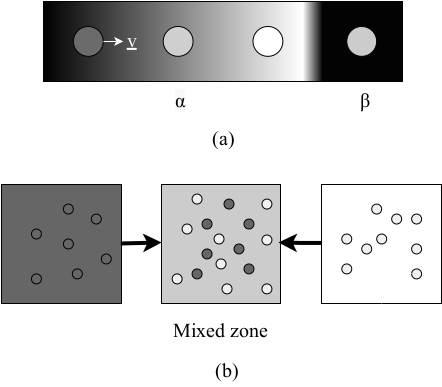Research Project
Computational simulations have evidenced promise in the design, study, prediction, and evaluation of an aerated stirred bioreactor for microorganisms as they provide information that is difficult or impossible to obtain through experiments, such as spatial variation in velocity, concentration, and growth rate of the microorganism. While microorganisms are travelling across the reactor, their intracellular states do not change suddenly, but rather dynamically. Additionally, considering that when microorganisms enter a mixed zone from various zones , the distribution of intracellular states in the mixed zone can be expected (See Figure 1). These aspects were often disregarded in the majority of reactor models.

Figure 1: (a) A microorganism (the circles) traverses a gradient of exterior states, from gradually changing environment denoted by α to the shock environment denoted by β, while progressively changing its intracellular state. (b) The variation of an intracellular state in the mixed zone
My research aims to develop a model and apply computational methods for the simulation of a multi-phase aerated stirred bioreactor of microorganisms. The multi-phase computational fluid dynamics/ compartment network model (CFD/CM) will be developed to simulate the hydrodynamics within an aerated stirred bioreactor. Subsequently it will be combined with a reduced computational complexity FBA rate-determination scheme (RCC-FBA scheme) to account the metabolic reaction. Lastly, the population balance model (PBM) will be utilized to record the previous history of microorganisms exposed to their trajectory environments, resulting in the distribution of intracellular states.
Thus far, I have completed the RCC-FBA scheme and integrated it with an existing compartment model to simulate diauxic growth of Escherichia coli in batch and continuous environments.
Expertise
- Genetic algorithm with local search
- Flux balance analysis models
- Population balance model for cell growth
Education
- 2018, Masters of Engineering, Chemical Engineering, King Mongkut’s University of Technology Thonburi (Bangkok, Thailand)
- 2016, Bachelor of Engineering, Chemical Engineering, King Mongkut’s University of Technology Thonburi (Bangkok, Thailand)